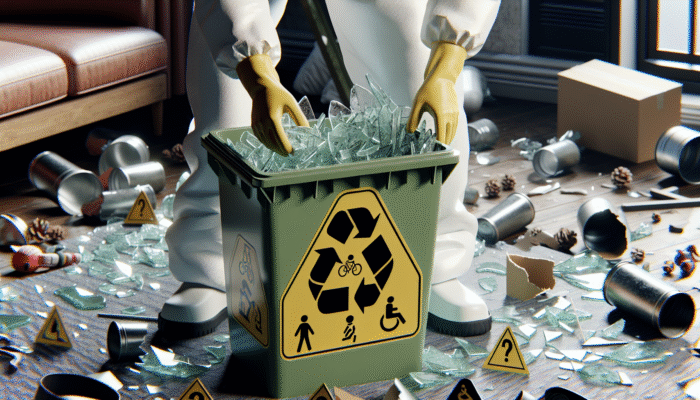Unlock the Full Potential of Glass Recycling for House Clearances Across the UK
The practice of recycling glass during house clearances in the UK is essential for promoting environmental sustainability, driving economic development, and ensuring adherence to regulatory compliance. The United Kingdom is dedicated to minimising its carbon footprint and nurturing a circular economy, which makes it imperative for homeowners and clearance professionals to grasp the extensive benefits tied to glass recycling. This proactive approach not only aligns with legal requirements but also plays a significant role in fostering a cleaner environment while strengthening local community ties.
Explore the Environmental Benefits of Glass Recycling

Participating in glass recycling is a critical step in reducing landfill waste. In the UK, around 1.5 million tonnes of glass are discarded every year, with a large portion ending up in landfills, where it can take hundreds of years to decompose. By engaging in recycling glass during UK house clearances, individuals can significantly contribute to a cleaner, healthier environment, as this practice effectively diminishes waste. Glass is infinitely recyclable, and the recycling process utilises 40% less energy compared to creating new glass from raw materials. This decrease in energy consumption directly results in lower greenhouse gas emissions, which is vital in the fight against climate change.
Furthermore, recycling glass conserves valuable natural resources. The essential materials needed for glass production, such as sand, soda ash, and limestone, are finite and require careful management. Through recycling, we safeguard these resources and reduce the environmental consequences tied to their extraction and transportation. The link between recycling and resource preservation highlights the importance of individual recycling actions, reinforcing the idea that even small efforts can contribute to a sustainable future.
Discover the Economic Advantages of Glass Recycling
The financial implications of recycling glass in UK house clearances are noteworthy. The recycling industry is a significant source of employment, creating jobs in various sectors, including collection, sorting, processing, and distribution. This sector has the potential to generate thousands of jobs, revitalising local economies, particularly in areas that host glass recycling facilities. These job opportunities cater to a wide range of skill sets, making them accessible to diverse demographics and enhancing economic resilience within communities.
In addition, prioritising glass recycling can reinforce local businesses and initiatives. When households commit to recycling during clearances, they boost the demand for local recycling services, stimulating the growth of these enterprises. This not only bolsters the local economy but also fosters a sense of communal responsibility towards adopting sustainable practices, ultimately leading to a unified commitment to environmental stewardship.
Comprehending the Legal Obligations for Glass Recycling
In the UK, the regulations governing waste management and recycling are constantly evolving. The Waste and Resources Action Programme (WRAP) outlines the legal responsibilities regarding proper waste disposal, including glass. Familiarity with these laws is crucial for anyone involved in house clearances, as non-compliance could result in hefty fines and damage one’s reputation within the industry.
Consequently, integrating recycling glass in UK house clearances is not merely a recommended practice; it is a legal necessity. Local councils routinely provide resources and guidance to facilitate compliance, ensuring that even smaller clearance operations can adhere to these standards. By following legal requirements, homeowners and companies contribute to a more responsible waste management system, paving the way for future sustainability initiatives.
Key Steps for Effective Glass Recycling in UK House Clearances

Successful glass recycling in UK house clearances begins with thorough preparation. Ensuring that glass items are systematically sorted, meticulously cleaned, and delicately handled can significantly enhance both the efficiency and effectiveness of the recycling process. Below are essential steps to consider for achieving optimal results.
Implementing a Structured Approach to Glass Sorting
Effective glass sorting is vital for attaining the best recycling outcomes. The primary categories of glass—clear, green, and brown—each have distinct characteristics and require tailored recycling methods. Clear glass, commonly found in a variety of bottles and jars, is the most frequently recycled type and holds the highest market value due to its remanufacturing potential. Green glass, typically used for wine and beer bottles, also possesses commendable recycling value. In contrast, brown glass, used for certain beverages and food products, may be less desirable due to its limited recycling applications.
To improve the recycling of glass during UK house clearances, homeowners and clearance teams should adopt a structured sorting method. Assigning specific containers for each type of glass can streamline the recycling process. This practice not only enhances the quality of the recycled glass but also diminishes contamination risks, ultimately leading to improved recycling rates and more favourable environmental outcomes.
Prioritising Thorough Cleaning of Glass Items for Recycling
Meticulously cleaning glass items is a critical step often neglected during house clearances. Residues from leftover food or beverages can contaminate the recycling stream, resulting in lower quality recycled materials. To elevate the quality of recycling glass in UK house clearances, it is essential to thoroughly rinse glass items before disposal. This straightforward practice, which may involve rinsing bottles and jars with warm water to eliminate any remaining contents, can yield significant improvements.
Besides rinsing, removing labels and caps can further streamline the recycling process. While some recycling facilities can handle labels, ensuring their removal guarantees that the glass meets quality standards. By adopting these cleaning practices, homeowners can greatly enhance the success of local recycling programmes, thus contributing to a greener future.
Prioritising Safe Handling Techniques for Glass Recycling

Safety should always be the foremost priority when preparing glass for recycling, particularly during house clearances where broken or sharp glass may be present. Wearing gloves is crucial when handling glass items to prevent cuts and injuries. Employing sturdy containers or boxes for transporting glass is also advisable, as this minimises the risk of breakage during transit to recycling facilities.
Moreover, it is essential to educate team members on appropriate handling procedures. Training sessions should encompass demonstrations on how to pack and transport glass safely, as well as protocols for managing broken glass. These precautions ensure that the process of recycling glass in UK house clearances is not only efficient but also safe for all parties involved.
Identifying Glass Recycling Facilities Across the UK
The availability of glass recycling facilities throughout the UK is crucial for ensuring the effective recycling of glass during house clearances. Understanding the available options empowers homeowners and clearance teams to make informed decisions regarding their recycling practices.
Leveraging Local Recycling Centres for Glass Disposal
Local recycling centres are invaluable resources for residents eager to recycle glass from house clearances. Most UK councils operate recycling facilities that accept a range of materials, including various types of glass. These centres are strategically located to maximise accessibility for the community, ensuring that residents can easily participate in recycling initiatives.
When planning a house clearance, it is beneficial to research nearby local recycling centres that specifically accept glass. Many councils provide online directories or contact information to assist residents in locating the nearest facility. This information simplifies the recycling process, making it more convenient for homeowners to sort and drop off their glass recycling.
Moreover, local recycling centres may offer additional services, such as community engagement programmes that educate residents about recycling. By participating in these initiatives, homeowners can stay informed about best practices and contribute to fostering a culture of sustainability within their communities.
Understanding Curbside Collection Services for Glass Recycling
A number of regions in the UK provide curbside glass collection services, making the recycling process more accessible than ever. This service typically includes designated collection days when residents can place their glass recycling at the curb for local authorities to collect, simplifying the overall procedure.
Utilising curbside collection services during house clearances in the UK can significantly streamline recycling efforts. Homeowners can prepare and sort their glass waste ahead of time, reducing the need for transportation to recycling centres. This not only saves valuable time but also encourages higher participation in recycling initiatives, thereby promoting a culture of responsible waste management.
To maximise the benefits of curbside collections, homeowners should remain informed about collection schedules and guidelines issued by their local councils. Some areas may have specific restrictions on the types of glass accepted, so being aware of these details can help avoid contamination and ensure effective recycling.
Collaborating with Specialist Recycling Companies for Efficient Solutions
Partnering with companies that specialise in glass recycling can be an excellent option for those involved in large-scale house clearances or requiring specialised services. These companies typically possess advanced processing facilities and expertise in managing glass materials, ensuring efficient and effective recycling operations.
Specialist recycling companies can offer tailored solutions for recycling glass in UK house clearances, especially for businesses or properties undergoing significant renovations. By collaborating with these organisations, homeowners and clearance teams gain access to additional resources, such as bulk collection services and comprehensive reporting on recycling outcomes.
Furthermore, aligning with specialist firms can enhance the overall sustainability of house clearances. These organisations are often pioneers in innovations related to recycling technology, and by partnering with them, homeowners can contribute to more effective and responsible recycling practices that benefit the environment.
Addressing Common Challenges and Implementing Effective Solutions in UK Glass Recycling
Despite the clear advantages of recycling glass in UK house clearances, several challenges must be tackled to enhance recycling efforts. Identifying these obstacles and implementing practical solutions can significantly improve the recycling landscape across the UK.
Combatting Contamination Issues in Glass Recycling
Contamination remains one of the most significant challenges in glass recycling. The improper disposal of non-recyclable materials alongside glass can result in the rejection of entire batches. This not only squanders valuable resources but also undermines the efficiency of recycling operations, ultimately harming the environment.
Education is paramount in effectively addressing contamination challenges. Local councils and community organisations can play a vital role in raising awareness about proper glass recycling practices. Initiatives may include informative campaigns, workshops, or outreach through social media to ensure residents are well-informed about acceptable materials for recycling.
Fostering a well-informed community can dramatically reduce contamination rates, leading to more successful glass recycling in UK house clearances. Additionally, implementing clear signage at recycling facilities can guide residents in correctly sorting their materials, further mitigating contamination risks and improving recycling outcomes.
Overcoming Logistical Challenges in Glass Recycling
Logistical difficulties also pose significant barriers to effective glass recycling. In urban areas, congestion and limited access to recycling facilities can complicate collection and processing efforts. Conversely, rural regions may face challenges due to the distances required to reach recycling centres, creating further obstacles to efficient recycling practices.
Thoughtful planning and coordination are essential to overcoming these logistical challenges. House clearance companies might consider establishing partnerships with local councils or waste management organisations to streamline collection efforts. Implementing scheduled collections and designated routes can optimise recycling logistics, ensuring that glass is transported to processing facilities efficiently without delays.
Moreover, investing in technology that enhances route planning and tracking can improve the overall efficiency of glass recycling operations. By leveraging technological advancements, clearance teams can ensure that glass recycling becomes an integral part of house clearances, benefiting both the environment and the community.
Enhancing Public Awareness of Glass Recycling
Boosting public awareness regarding the significance of glass recycling remains a persistent challenge. Many residents may not fully grasp the benefits of recycling glass or may lack knowledge about how to effectively participate in recycling programmes.
Community engagement initiatives can play a pivotal role in elevating public awareness. Hosting local events, workshops, or educational programmes that concentrate on recycling education can significantly improve participation rates. By providing clear information and engaging residents in enjoyable and informative ways, a culture of recycling that extends beyond house clearances can be nurtured.
Media campaigns that highlight the environmental and economic benefits of recycling glass in UK house clearances can also be impactful. By showcasing success stories and practical tips, more individuals can be inspired to take action and actively participate in recycling efforts within their communities.
Showcasing Successful Case Studies of Glass Recycling in UK House Clearances
Analysing successful case studies of recycling glass in UK house clearances reveals best practices and innovative strategies that can be emulated throughout the country. These examples illustrate how effective recycling can be achieved when communities collaborate, whether in urban or rural settings.
Urban House Clearance Projects: Inspiring Success Stories
Urban areas face unique challenges in glass recycling; however, many local councils have successfully implemented programmes that establish high standards for effective recycling practices. Initiatives in cities like London and Manchester have introduced community-centric programmes aimed at boosting recycling rates through resident involvement and education.
Beyond standard recycling services, these urban projects often incorporate outreach initiatives that actively engage residents in recycling efforts. For instance, events encouraging residents to participate in clean-up days can raise awareness about the importance of recycling glass in UK house clearances, ultimately reducing contamination and enhancing the overall success of recycling initiatives.
These urban success stories underscore the potential of community-driven efforts, demonstrating that substantial progress can be made in promoting effective glass recycling practices when residents are informed and motivated.
Rural House Clearance Initiatives: Innovative Approaches
Rural areas may encounter different challenges in glass recycling compared to urban environments, primarily due to distance and accessibility issues. Nevertheless, creative initiatives have emerged that demonstrate how rural communities can successfully recycle glass.
For example, several rural councils have developed mobile recycling units that travel to various locations within communities. These units enable residents to recycle glass without the burden of travelling long distances. They collect recyclables and provide education on proper recycling practices to directly address contamination concerns.
Such initiatives highlight the adaptability of glass recycling programmes in diverse contexts, showcasing that effective practices are not exclusively the domain of urban centres. By fostering localised solutions tailored to specific community needs, rural areas can enhance their recycling efforts in UK house clearances and contribute to a more sustainable future.
Managing Glass Recycling in Large-Scale Clearance Operations
Large-scale house clearances often present unique challenges, particularly in effectively managing glass waste. However, successful examples from organisations specialising in large-scale operations illustrate how efficient recycling can be achieved on a significant scale.
These organisations typically implement comprehensive recycling strategies, including thorough staff training on proper glass sorting and handling protocols. They establish partnerships with recycling facilities to ensure that glass is efficiently transported and processed correctly.
By employing advanced tracking technologies and data analytics, these large-scale operations can monitor recycling rates, evaluate contamination levels, and refine recycling practices. Their success emphasises the importance of systematic approaches to recycling glass in UK house clearances, demonstrating that even extensive projects can yield sustainable outcomes when managed effectively.
Innovative Techniques Revolutionising Glass Recycling in House Clearances
Innovation plays a pivotal role in shaping the future of glass recycling, particularly in the context of house clearances. Numerous UK companies are pioneering advanced techniques that enhance the efficiency and effectiveness of glass recycling efforts.
For instance, some organisations are exploring cutting-edge sorting technologies that utilise artificial intelligence to identify and separate different types of glass. These technologies can significantly reduce contamination risks and improve the quality of recycled materials, making the recycling process more efficient and sustainable.
Additionally, innovative approaches to product design, such as developing glass containers that are easier to recycle, can bolster sustainability efforts. By collaborating with manufacturers to advocate for such practices, clearance teams can further enhance glass recycling in the UK house clearance sector, ensuring that recycling remains a viable and responsible practice for future generations.
Envisioning the Future of Glass Recycling in UK House Clearances
Looking ahead, the future of recycling glass in UK house clearances is promising, with numerous technological advancements, policy changes, and community engagement initiatives on the horizon that will strengthen recycling efforts nationwide.
Leveraging Technological Innovations for Enhanced Recycling
Anticipating technological advancements that will optimise glass recycling is crucial for ensuring sustainable practices. Innovations such as improved sorting technologies and advanced processing methods are set to transform the industry. For example, incorporating blockchain technology could facilitate better tracking of glass recycling processes, enhancing transparency and accountability across the recycling chain.
Moreover, advancements in recycling machinery may lead to greater efficiency in processing glass, ultimately reducing costs and improving the quality of recycled materials. By embracing these technologies, homeowners and clearance companies can position themselves at the forefront of sustainable practices in the UK, ensuring a greener future for all.
Staying Updated on Policy Changes that Influence Recycling
Keeping abreast of policy changes that affect glass recycling is essential for maintaining compliance and effectiveness in house clearances. Recent trends indicate a shift towards stricter regulations on waste management, including the introduction of deposit return schemes designed to boost recycling rates and decrease littering.
Being informed about policy developments will help homeowners and clearance teams adjust their practices to comply with new regulations. Engaging with local councils and industry organisations can also provide valuable insights into upcoming changes and their potential implications for recycling efforts.
Such proactive measures ensure that recycling glass in UK house clearances remains a practical and legally compliant endeavour, contributing significantly to a more sustainable future for everyone.
Encouraging Community Involvement for Successful Recycling
Fostering community engagement is vital for sustaining and enhancing glass recycling initiatives. Involving residents through workshops, community clean-up events, and educational campaigns can significantly raise awareness and encourage participation in recycling practices.
Community leaders play an essential role in motivating individuals to take ownership of their recycling responsibilities by highlighting the benefits of recycling glass in UK house clearances. Collaborating with schools, organisations, and businesses can create a comprehensive approach to recycling that resonates with diverse demographics and nurtures a culture of sustainability.
This grassroots engagement not only strengthens community bonds but also leads to increased recycling rates and improved environmental outcomes, cultivating a more responsible and sustainable future.
Investigating Economic Incentives to Promote Glass Recycling
Examining the economic advantages and incentives that encourage glass recycling is crucial for fostering sustainable practices. Government initiatives, such as grants for recycling programmes or subsidies for local recycling companies, can significantly incentivise participation among residents and businesses.
Furthermore, implementing incentives for households that actively engage in recycling, such as reduced waste management fees, can motivate residents to adopt better recycling habits. Local councils can create a win-win scenario that benefits both the community and the environment by aligning economic incentives with sustainability objectives.
These economic strategies ensure that recycling glass in UK house clearances is not only a responsible choice but also a financially viable one, supporting long-term sustainability initiatives that benefit all involved.
Your Questions Answered: FAQs About Glass Recycling
Which types of glass can be recycled during UK house clearances?
Most types of glass can be recycled, including clear, green, and brown glass bottles and jars. However, items such as window glass, mirrors, and drinking glasses are generally not accepted in standard recycling programmes due to their differing compositions.
How do I prepare glass for recycling during a house clearance?
To prepare glass for recycling, sort it by type (clear, green, brown), rinse out any residues, and remove labels and caps. Wearing gloves is also advisable when handling glass to prevent cuts or injuries, ensuring a safer recycling process.
Are there local recycling centres that accept glass in my area?
Yes, most UK councils operate local recycling centres that accept glass. Check your council’s website for detailed information on locations and the specific materials they accept for recycling.
What is curbside collection for glass recycling?
Curbside collection is a service provided by local councils, allowing residents to leave their glass recycling at the curb for collection on designated days. This service simplifies the recycling process, making participation more convenient for households.
How can I reduce contamination when recycling glass?
To minimise contamination, ensure that only acceptable glass types are placed in recycling bins, rinse out any residues, and adhere to local guidelines regarding recycling practices. This will help improve the overall quality of recycled materials.
What challenges does glass recycling face in the UK?
Challenges include contamination from non-recyclable materials, logistical difficulties in collection and processing, and a lack of public awareness regarding proper recycling practices. Addressing these challenges is essential for improving recycling rates and outcomes.
Are there any economic benefits of glass recycling for communities?
Indeed, glass recycling can create jobs, support local recycling industries, and potentially lower waste management costs for communities that actively engage in recycling, thereby fostering a more sustainable local economy.
How do large-scale house clearances manage glass recycling?
Large-scale operations typically employ comprehensive recycling plans, including thorough staff training on proper glass sorting and handling procedures. They maintain partnerships with recycling facilities to ensure that glass is efficiently transported and processed correctly.
What innovations are being explored in glass recycling?
Innovations include advancements in sorting technologies, artificial intelligence for glass identification, and improvements in recycling machinery that enhance efficiency and output quality, contributing to more effective recycling practices.
How can I engage my community in glass recycling initiatives?
You can engage your community by organising events and educational programmes, and collaborating with local organisations to raise awareness about recycling and promote participation in glass recycling efforts within your area.
Join our Facebook community!
The Article: Recycling Glass in UK House Clearances: A Comprehensive Guide Was First Found At https://birminghamhouseclearance.com
The Article Recycling Glass: Essential Tips for UK House Clearances Was Found On https://limitsofstrategy.com
The Article Recycling Glass Tips for Efficient UK House Clearances found first on https://electroquench.com

